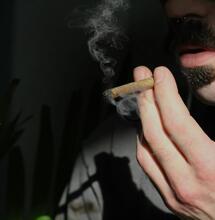Quitting Weed Sleep Problems Aren't Nice, Here's What You Should Do

There comes a point when you have to pause or even quit smoking. For a lot of users, it means goodbye to sweet dreams.
Relaxing and having a good night's sleep was your intention in the first place, right? Half joint before going to bed, and you'll make it through the night. Quitting weed sleep problems is no news for many stoners who've decided to take a short or longer break.
It has been a tough year for most of us, and not surprisingly, marijuana was the most popular and most frequently used drug, according to one research by Drugs and Me. And if we see the numbers of last April: 49 percent of survey participants were using it on a daily basis and amazingly 88 percent once or a few times a week.
You are not even sorry, right? Keeping in mind these numbers, one must ask, when it’s time to take a break? And if you are considering this, we would like to inform you about some side effects in the first few days and, of course, to give you some tricks and tips for improving your cannabis-free sleeping pattern.
Withdrawal symptoms
You surely have heard of withdrawal symptoms. It's your body's reaction when you stop consuming a certain substance that you have consumed in a while, and suddenly there's a need for you to restrict it. Whether it is food, beverages, or drugs, withdrawal symptoms are sometimes unpleasant until our body adjusts to the new routine. Weed withdrawal symptoms are incredibly mild, and they are not life-threatening, and the only risk is failing to do so.
Then, why is it so hard? Exactly because we think it is a piece of a cake at the start. Just think of this one other study from Duke University concerning 469 adult weed consumers, determined to cut off; it revealed that 95.5% of them experienced at least one withdrawal symptom while 43.1% experienced more than one. This was significantly related to the partakers habits: how often and how much the participants consumed weed before cutting-off.
Quitting Weed Sleep Problems
Well, speaking about cannabis, many users have experienced insomnia and sleep hindrances after they’ve stopped using weed. The explanation is simple: THC improves the sleep-wave cycle and induces deep sleep. Good sleep is everything, and this is why you are back in the vicious cycle. One research from 2008 reveals that up to 65 percent of former cannabis users identified exactly poor sleep as a reason for relapsing.
And not only sleepless nights. Even if you manage to fall asleep, you risk having nightmares and very vivid dreams that also disrupt their sleep. Most likely, you will dream of a beautiful big joint. Insomnia can trigger and reinforce other withdrawal symptoms, and here are some of them:
Headaches
Sleepless nights are leading to one of the most common physical symptoms—headaches. After quitting, many weed lovers have experienced very intense headaches that can last for a few weeks up to a couple of months.
Cravings
Familiar feeling? Restriction leads to craving, and perhaps that is why most weed smokers don’t believe that they are addicted until the craving signs—especially the first few days of abstinence.
Mood swings
Finally, everyone can understand how girls feel in PMS. Irritability, having a hard time concentrating, anxiety, and even anger episodes can be very common. It is even worse if the quitting is not by choice but you are forced. But with persistence and willpower, anything can be achieved. We believe in you, and below are some sleeping wellness tips that can ease the problem!
Quitting weed sleep problems can feel like a real torture for some people.
What exactly bothers you?
The world pandemic, we got it! But really, is it a mental health issue prevailing your sleeping routine or the quitting weed? Mental health these days can be very fragile, and professional help is something to consider. But if it’s more a problem of your bad habits (e.g., endlessly scrolling on phone applications), be mindful and be prepared to set some boundaries.
Start writing notes: what keeps you awake at night, your fears and struggles (e.g., will the pandemic ever end? will I ever share a joint with a friend again?), and this way, at least you are identifying the problem, which will be easier to solve in time.
Counting sheep?
It’s not gonna be easy for sure, but simply you must find what works for you. Yes, binging on Netflix is great, but you have to ask yourself, is it really worth it to feel like a zombie the next day. Leave the phone about an hour before bed, keep it on silent and discover the world of reading again.
A long book, let’s say some classic of Zola, will take you far in the 19th century and will open a new dreamy world. Sounds boring? Perhaps, but it works! And just imagine what reading Zola high on THC would look like. The letters are probably going to swim on the page. Bet it works like a sleeping pill.
Switch to CBD Oil
Cannabidiol or CBD is a constituent part of marijuana, and the difference between an actual weed and CBD oil is that it doesn't have the THC to make you high, but it can help if you're struggling with anxiety, depression, insomnia, and other sleep disorders. On a side note, CBD also shows promise as a medicine against COVID-19. In a way, CBD can work as a replacement for THC.
Just be wary of some of the occasional side effects which could include diarrhea, digestion problems, excessive appetite, or changes in weight. That is why you probably want to consult your doctor before starting using it. Or at least keep at low dosages as you test how your body reacts to it. The whole point is to change something, not to create another problem, right?
Quitters may actually find comfort in CBD oil. A lot of branded CBD oils such as Evopure's can comfort those with sleeplessness.
Changing Your Lifestyle
This probably will be the hardest part. After identifying the problem and arming yourself with information about what can go wrong or right, now is the time to deeply change some of your old rituals and embrace new ones.
1. Physical activity
A crucial element that affects not only your regular sleeping but your health in general, no matter if you are a stoner or not. Exercising provides your brain with a regular and healthy circadian rhythm, which regulates the sleep-wake cycle, returns your cognitive function, which, to be honest, might get damaged by consuming too much weed. Running, yoga, pilates sweats away the toxins and negative thought patterns. As long as you do not overdo any exercise, particularly not overdo it before bedtime, it should help your sleep.
2. A bedroom from your dreams
It doesn't have to be the bed of Louis XIV. Just keep in mind that a fresh and clean sleeping environment will give you the needed comfort, and you will feel less irritated and calmer. This will enhance the melatonin production needed for your sleep.
3. Nutrition
Giving up weed and now pizza, too? Like life isn’t hard enough already. Start with small steps. Put some more fruits on your plate that boost melatonin: banana, watermelon, cherries. Try some veggies as well and you might be surprised. Processed food is a no-no, especially before bed, but popcorn, nuts, dark chocolate are completely fine as all of them are natural sources of serotonin, melatonin, and magnesium. Try frozen yogurt instead of ice cream, it is more nutritional and will fill your tummy before sleep.
From readily available over-the-counter supplements, you can combine vitamin B and magnesium. It may calm any tachycardia you might have (another side effect that can come from taking too much weed or that can just accompany sleeplessness), and it will also help you have more hours of sleep.
4. Sleeping routine
A regular sleeping routine is essential not only to those who are quitting weed but for every individual. We have already mentioned reading books, clean shit, and setting the phone aside. What is also beneficial is taking a warm bath or shower. After a warm shower, changing the body temperature makes your body evaporate, and melatonin slowly starts to induce. Relaxing classical tunes will help too—routine means going to bed and waking up at the same time.
5. Beverages and alcohol
Everything in moderation is the main rule here. Some find a glass of wine or a beer beneficial before going to bed; for others, warm camomile tea or milk is better. Just keep in mind to be in reasonable amounts, so you don’t need to visit the bathroom in the middle of the night. If you choose the alcohol, it might help to fall asleep faster, but you won’t be sleeping long, and you will keep waking up throughout the night. Also, the restlessness and the night sweats are nothing compared with the morning hangover.
And take your time, no rush! Persistence and dedication are skills that will progress in time, and you will succeed in your goal. As long as you know that one day soon you again are going to refill your stash with weed.



